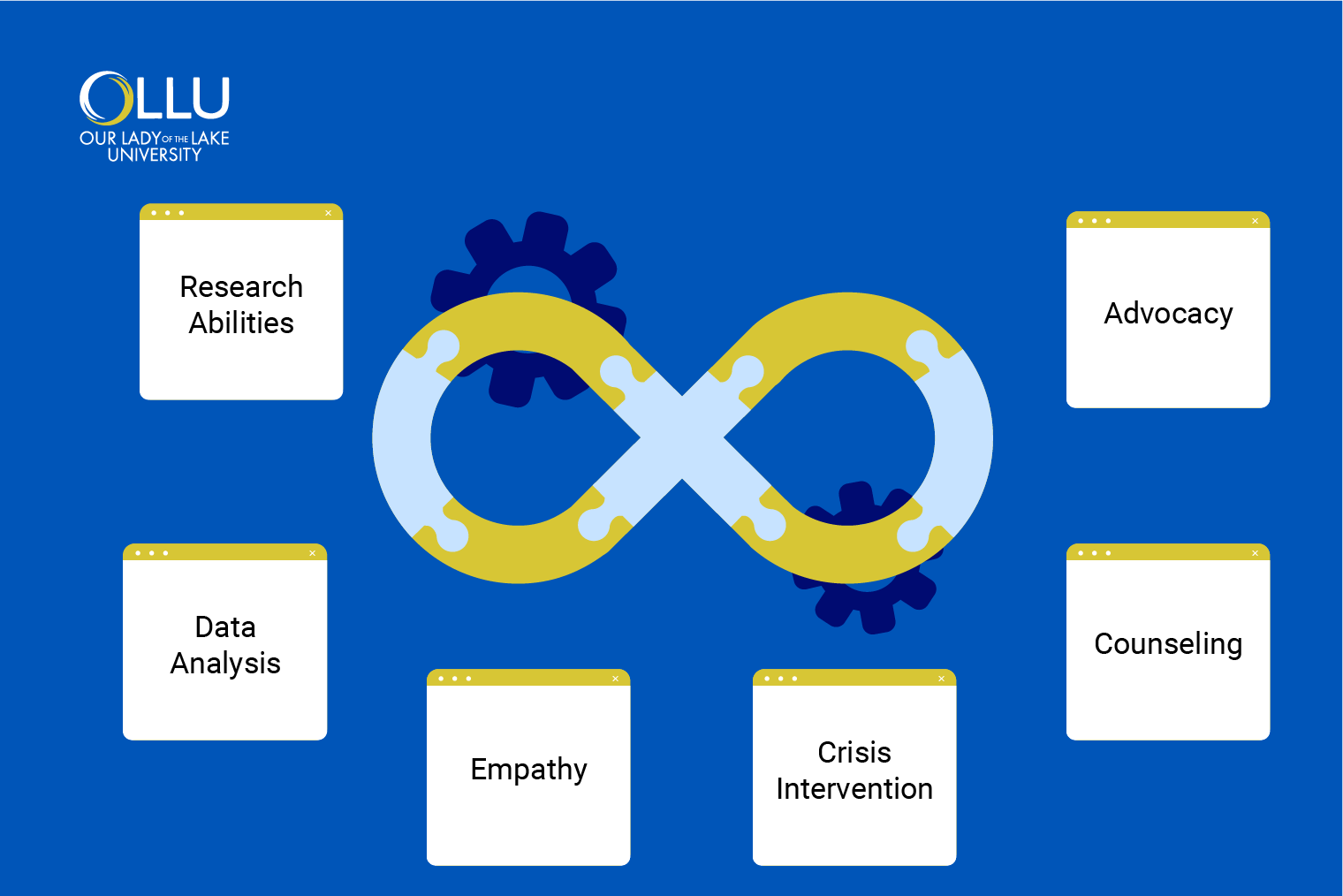Educational Psychology vs. School Psychology: Key Differences
Mar 09, 2024
 Educational psychology and school psychology are two distinct yet closely related fields that are pivotal in enhancing educational
experiences and promoting student well-being. While both disciplines focus on understanding
and improving the learning process, their scope, methodologies, and areas of expertise
differ.
Educational psychology and school psychology are two distinct yet closely related fields that are pivotal in enhancing educational
experiences and promoting student well-being. While both disciplines focus on understanding
and improving the learning process, their scope, methodologies, and areas of expertise
differ.
In exploring "educational psychology vs. school psychology," we will delve into the key differences between these two disciplines, shedding light on their unique contributions to education and highlighting their significance in fostering academic success and psychological well-being among students. By examining their distinct perspectives and methodologies, we can gain a deeper understanding of how these fields collaborate to support the holistic development of learners within educational settings.
Understanding the Basics
Understanding the basics of educational psychology and school psychology involves grasping the fundamental concepts and definitions that underpin these fields. Educational psychology studies how individuals learn and develop within academic settings, examining factors such as cognitive processes, motivation, and instructional strategies. On the other hand, school psychology is concerned with applying psychological principles to address students' social, emotional, and academic needs, often through assessment, intervention, and consultation services.
These disciplines share a common goal of improving educational outcomes and fostering student well-being, yet they diverge in their approaches and areas of emphasis. Clarifying these foundational concepts sets the stage for a comprehensive exploration of the distinctions between educational psychology and school psychology.
What is Educational Psychology?
Educational psychology is a multifaceted discipline investigating the psychological factors influencing learning, teaching, and academic processes. At its core, educational psychology seeks to understand how individuals acquire knowledge, develop skills, and engage in educational experiences. This field encompasses various topics, including cognitive processes such as memory, attention, problem-solving, and motivational factors influencing learning outcomes.
Professionals working in educational psychology examine the effectiveness of different teaching methods, curriculum designs, and academic interventions to optimize the learning environment and enhance student achievement. So, by studying the interactions between learners, educators, and instructional materials, educational psychologists gain valuable insights into the complexities of the educational process and develop strategies for promoting academic success and fostering lifelong learning.
What is School Psychology?
School psychology is a specialized field within psychology that focuses on addressing the mental health, behavioral, and academic needs of students within the school setting. Unlike educational psychology, which encompasses a broader range of topics related to learning and development, school psychology specifically targets the unique challenges and opportunities present in educational environments.
School psychologists are trained to assess and support students' socio-emotional well-being, cognitive functioning, and academic achievement through various interventions and strategies. They collaborate closely with educators, administrators, parents, and other professionals to create safe, supportive, and inclusive learning environments that foster students' overall success. With a primary focus on mental health, behavior management, and academic success within schools, school psychology is critical in promoting positive student outcomes and enhancing educational systems' effectiveness.
Education Requirements
To pursue educational and school psychology careers, you need to complete graduate-level programs, obtain relevant certifications or licensure, and gain practical experience through internships or supervised practice. While educational psychology often requires a Ph.D. or Ed.D., school psychology may require an SSP (Specialist in School Psychology) or a doctoral degree (e.g., Psy.D. or Ph.D.).
Educational Psychology
Educational psychology professionals typically demand advanced academic degrees like a Ph.D. or Ed.D. in Educational Psychology or a related field, offering rigorous training in psychological theory, research methods, assessment techniques, and educational practices. In addition, some may pursue specialized certifications or licensure to enhance their credentials, which may involve completing supervised clinical experience, passing licensure exams, and meeting continuing education requirements.
School Psychology
Individuals interested in school psychology typically complete graduate programs leading to a Master of Science in School Psychology or a Psy.D. or Ph.D. in School Psychology. Accredited programs offer comprehensive training in psychological assessment, counseling, intervention strategies, consultation, and collaboration. State licensure or certification is required, often involving passing an exam and completing supervised practice hours. Furthermore, optional certifications like the NCSP demonstrate expertise and commitment to professional excellence.
Career Opportunities
Educational psychology and school psychology offer diverse career paths across various settings, including academic institutions, government agencies, non-profit organizations, research institutions, and private practice. Professionals in both fields can contribute meaningfully to addressing the diverse needs of students, educators, families, and communities.
Educational Psychology
Educational psychologists have various career paths, including:
- Research: Conducting studies on learning, teaching methods, interventions, and student development.
- Teaching: Instructing courses in psychology, education, or related fields at different educational levels.
- Curriculum Development: Designing and evaluating educational materials, programs, and instructional strategies.
- Educational Consulting: Providing expertise to schools, districts, policymakers, and organizations on assessment, program evaluation, student support services, and professional development.
These options allow educational psychologists to enhance educational practices and outcomes across different levels of the education system.
School Psychology
Professionals in school psychology have diverse career opportunities focused on supporting students' academic, social-emotional, and behavioral needs within educational settings. Their roles include:
- Assessment: Conducting evaluations to identify learning disabilities, developmental delays, behavioral challenges, and mental health concerns.
- Intervention: Developing and implementing tailored strategies to promote academic success and well-being, collaborating with educators, families, and professionals.
- Counseling: Providing therapeutic services for social-emotional issues such as anxiety, depression, trauma, or family difficulties.
- Crisis Intervention: Offering support and mental health services during traumatic events or emergencies for students, staff, and families.
These roles create safe, supportive, and inclusive learning environments where all students can thrive academically and emotionally.
Skill Sets and Traits for Success
 Success in educational and school psychology requires diverse skills and traits. Professionals
need strong analytical, communication, and teamwork abilities, empathy, and cultural
competence. Proficiency in research, data analysis, assessment, and intervention techniques
is crucial for driving positive outcomes. Additionally, a commitment to lifelong learning,
adaptability, resilience, and ethical practice is essential for navigating the dynamic
landscape of education and psychology, ultimately contributing to student well-being
and success.
Success in educational and school psychology requires diverse skills and traits. Professionals
need strong analytical, communication, and teamwork abilities, empathy, and cultural
competence. Proficiency in research, data analysis, assessment, and intervention techniques
is crucial for driving positive outcomes. Additionally, a commitment to lifelong learning,
adaptability, resilience, and ethical practice is essential for navigating the dynamic
landscape of education and psychology, ultimately contributing to student well-being
and success.
Educational Psychology
In educational psychology, key skills for success include:
- Research abilities: Designing and conducting studies on learning, teaching methods, and interventions.
- Data analysis: Analyzing research findings to inform educational practices.
- Communication: Conveying research findings, collaborating with stakeholders, and advocating for evidence-based practices.
- Empathy: Understanding and empathizing with diverse student, educator, and family experiences.
- Understanding of learning theories: Applying cognitive, behavioral, and socio-cultural perspectives to develop effective interventions.
School Psychology
In school psychology, practitioners require a diverse range of skills for effective practice:
- Assessment techniques: Proficiency in conducting comprehensive assessments to identify students' academic, social-emotional, and behavioral needs.
- Crisis intervention: Ability to provide timely and effective support to students, staff, and families during crises or emergencies.
- Collaboration: Working collaboratively with educators, parents, and other professionals to develop and implement interventions that support student success.
- Counseling: Providing students with individual and group counseling services to address social-emotional issues, behavioral challenges, and academic concerns.
- Advocacy: Advocating for the rights and well-being of students, promoting equitable access to resources and support services within the school community.
Financial Considerations
As per the U.S. Bureau of Labor Statistics (BLS), psychologists, including those in educational and school psychology, earn a median annual wage of $85,330. However, salaries vary based on location, education level, experience, and job type. Job prospects for psychologists in these fields show consistent growth, with an estimated 6% increase in employment from 2022 to 2032, exceeding the average for all occupations.
Despite opportunities for advancement and competitive pay, aspiring professionals must consider the expenses associated with graduate education and licensure. While graduate programs in psychology can be expensive due to tuition, fees, and living costs, financial aid, scholarships, and assistantships may help offset these expenses. Prospective individuals should weigh these financial aspects against their career goals and potential long-term benefits.
The Bottom Line
In conclusion, educational psychology and school psychology are two distinct yet complementary fields that play crucial roles in supporting learners' educational and socio-emotional needs. While educational psychology focuses on understanding learning processes and educational practices, school psychology emphasizes mental health, behavior, and academic success within the school environment. By understanding the key differences between these disciplines, individuals can make informed decisions about their career paths and contribute effectively to advancing education and psychological well-being.
Frequently Asked Questions (FAQs)
Is a School Psychologist a Doctor?
While some school psychologists may hold doctoral degrees (e.g., Psy.D. or Ph.D. in School Psychology), it is not a requirement to practice as a school psychologist. Many school psychologists hold specialist-level degrees (e.g., SSP) or master's degrees in school psychology.
What does educational psychology belong to?
Educational psychology is a subfield that focuses on understanding how individuals learn and develop within educational settings. It draws on theories and research from psychology, education, and related disciplines to inform educational practices and policies.
What are the five scopes of educational psychology?
Educational psychology encompasses various areas, including learning theories, motivation, instructional design, assessment and evaluation, classroom management, and educational interventions. Educational psychologists may also study cognitive development, social-emotional learning, diversity and inclusion, and educational technology.
What is the main difference between psychology and educational psychology?
While psychology is the scientific study of human behavior and mental processes, educational psychology focuses on understanding how individuals learn and develop within educational settings. Educational psychology draws on principles and theories from psychology to inform educational practices and policies, whereas psychology encompasses a broader range of topics and applications beyond the educational context.